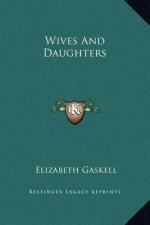Mr. Preston had many causes for rejoicing: he might have forgotten this discomfiture, as he chose to feel it, in the remembrance of an increase of income, and in the popularity he enjoyed in his new abode. All Hollingford came forward to do the earl’s new agent honour. Mr. Sheepshanks had been a crabbed, crusty old bachelor, frequenting inn-parlours on market-days, not unwilling to give dinners to three or four chosen friends and familiars, with whom, in return, he dined from time to time, and with whom, also, he kept up an amicable rivalry in the matter of wines. But he ‘did not appreciate female society,’ as Miss Browning elegantly worded his unwillingness to accept the invitations of the Hollingford ladies. He was unrefined enough to speak of these invitations to his intimate friends aforesaid in the following manner, ‘Those old women’s worrying,’ but, of course, they never heard of this. Little quarter-of-sheet notes, without any envelopes—that invention was unknown in those days—but sealed in the corners when folded up instead of gummed as they are fastened at present, occasionally passed between Mr. Sheepshanks and the Miss Brownings, Mrs. Goodenough or others. In the first instance, the form ran as follows:—’Miss’ Browning and her sister, Miss Phoebe Browning, present their respectful compliments to Mr. Sheepshanks, and beg to inform him that a few friends have kindly consented to favour them with their company at tea on Thursday next. Miss Browning and Miss Phoebe will take it very kindly if Mr. Sheepshanks will join their little circle.’
Now for Mrs. Goodenough:—




